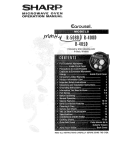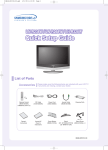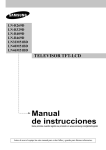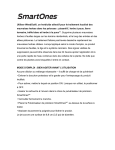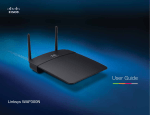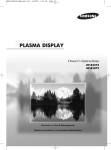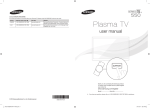Download Samsung LN-R408D Owner`s manual
Transcript
BN68-00515U-X0Eng.qxd 1/5/05 10:00 PM Page 1 List of Parts Accessories Remote Control (BN59-00460A) & Batteries (AAA x 2) Owner's Instructions Please make sure the following items are included with your LCD TV. If any items are missing, contact your dealer. RF Cable (AA39-00039A) Anynet AV Owner’s Instructions Power Cord (3303-000085) Cover-Bottom LN-R408D (BN63-01640A) Cleaning Cloth (BN63-001798A) Anynet Cable (BN39-00518B) BN68-00515U-00 BN68-00515U-X0Eng.qxd 1/5/05 10:00 PM Page 2 Connecting Antenna/Cable TV TV Rear Panel Antenna RF Cable Cable TV 1 Plug the antenna/cable TV lead into the ANT1 IN (CABLE) terminal on the bottom of the back panel. When connecting the RF cable to the antenna input terminal, keep the copper wire portion of the RF cable straight to avoid bending it. For more detailed antenna/cable TV connections, see pages 7-10 of the owner's manual. Connecting a VCR TV Rear Panel VCR Rear Panel 1 Cable or Antenna 1 2 3 4 4 3 2 Audio Cable (Option) Video Cable (Option) RF Cable Connect the cable or antenna to the ANT IN terminal on the back of the VCR. Connect an RF cable between the ANT OUT terminal on the VCR and the ANT1 IN (CABLE) or ANT 2 IN (AIR) terminal on the TV. Connect a video cable between the VIDEO OUT jack on the VCR and the AV IN [VIDEO] jack on the TV. Connect an audio cable between the AUDIO OUT jacks on the VCR and the AV IN [R-AUDIO-L] jacks on the TV. If you have a “mono” (non-stereo) VCR, use a Y-connector (not supplied) to hook up to the R-AUDIO-L jacks on the TV. BN68-00515U-X0Eng.qxd 1/5/05 10:00 PM Page 3 Connecting an S-VHS VCR TV Rear Panel VCR Rear Panel 4 1 3 2 Cable or Antenna 1 2 3 4 Audio Cable (Option) S-Video Cable (Option) RF Cable Connect the cable or antenna to the ANT IN terminal on the back of the VCR. Connect an RF cable between the ANTOUT terminal on the VCR and the ANT1 IN(CABLE) or ANT 2 IN(AIR) terminal on the TV. Connect an S-video cable between the S-VIDEO OUT jack on the VCR and the [S-VIDEO] jack on the TV. Connect an audio cable between the AUDIO OUT jacks on the VCR and the [R-AUDIO-L] jacks on the TV. An S-Video cable is usually included with an S-VHS VCR. Connecting a DVD / Samsung Set-top box via DVI DVD Player Rear Panel TV Rear Panel 2 1 Audio Cable (Option) DVI to HDMI Cable (Option) 1 Connect a DVI to HDMI cable or DVI-HDMI Adapter (DVI to HDMI) between the HDMI/DVI connector on the TV and DVI connector on the DVD player/Set-top box. 2 Connect an audio cable between the DVI [R-AUDIO-L] jacks on the TV and the AUDIO OUT jacks on the DVD player/Samsung Set-top box. DVI-D does not support PC function. BN68-00515U-X0Eng.qxd 1/5/05 10:00 PM Page 4 Connecting a DVD Player TV Rear Panel DVD Player Rear Panel 1 2 Audio Cable (Option) Component Cable (Option) 1 Connect an audio cable between the COMPONENT IN 1 [R-AUDIO-L] jacks on the TV and the AUDIO OUT jacks on the DVD player. 2 Connect a component video cable between the COMPONENT IN 1 or COMPONENT 1 IN [PR, PB, Y] jacks on the TV and the COMPONENT [Y, PB, PR] jacks on the DVD player. Each external input source device (DVD, STB, VCR etc.) has a different back panel configuration. Connecting a DVD / Set-top box via HDMI DVD Player Rear Panel TV Rear Panel 1 1 HDMI Cable (Option) Connect a HDMI cable between the HDMI/DVI connector on the TV and the HDMI connector on the DVD player/Set-top box. What is HDMI? • HDMI, or high-defintion multimedia interface, is a next-generation interface that enables the transmission of digital audio and video signals using a single cable without compression. • “Multimedia interface” is a more accurate name for it especially because it allows multiple channels of digital audio (5.1 channels). The difference between HDMI and DVI is that the HDMI device is smaller in size, has the HDCP (High Bandwidth Digital Copy Protection)coding feature installed, and supports multi-channel digital audio. BN68-00515U-X0Eng.qxd 1/5/05 10:00 PM Page 5 Connecting a Digital Audio System Digital Audio System TV Rear Panel 1 1 Optical Cable (Option) Connect an audio Optical between the DIGITAL AUDIO OUT (OPTICAL) jack on the TV and the Digital Audio Input (OPTICAL) jack on the Digital Audio System. Connecting an Amplifier/DVD Home Theater TV Rear Panel Amplifier/DVD Home Theater 1 1 Audio Cable (Option) Connect an audio cables between the AUDIO OUT [R-AUDIO-L] jacks on the rear of your TV and the other ends to the corresponding audio in jacks on the Amplifier or DVD Home Theater. Connecting a PC TV Rear Panel PC 2 1 1 2 PC Audio Cable (Option) PC Video Cable (Option) Connect the D- Sub cable to “PC” (PC IN) on the TV. Connect the stereo audio cable to “AUDIO” (PC IN) on the TV and the other end to “Audio Out” of the sound card on the computer. BN68-00515U-X0Eng.qxd 1/5/05 10:00 PM Page 6 Plug & Play When the TV is initially powered on, two basic customer settings proceed automatically and subsequently: Setting Auto program, Clock. 1 Press the POWER control. button on the remote The message “Menu language, Channels and Time will be set.” is displayed. Press the ENTER button, then “Select the language of the OSD” menu is automatically displayed. 2 Press the ENTER button to enter the language. Press the UP/DOWN buttons to select language, then the ENTER button. “Select the antennas to memorize.” menu is automatically displayed. 3 Press the UP/DOWN buttons to memorize the channels of the selected connection. Press the ENTER button to select “Start”. 4 Press the UP/DOWN buttons to select “Digital Channel”, then press the ENTER button. Press the UP/DOWN buttons to select “STD”, “HRC” or “IRC”, press the ENTER button. Press the UP/DOWN buttons to select “Analog Channel”, then press the ENTER button. Press the UP/DOWN buttons to select “STD”, “HRC” or “IRC”, press the ENTER button. Press the UP/DOWN buttons to select “Start”, then press the ENTER button to memorize the channels. BN68-00515U-X0Eng.qxd 1/5/05 10:01 PM Page 7 5 The TV will begin memorizing all of the available channels. After all the available channels are stored, the Auto program menu reappears. Press the ENTER button when channel memorization is complete. “Set to daylight savings time.” menu is auto matically displayed. 6 Press the ENTER button. Press the UP/DOWN buttons to select “Yes” or “No”, then the ENTER button. “Select your time zone in which you live” menu is automatically displayed. 7 Press the UP/DOWN buttons to highlight the time zone for your local area (and to move the highlight to the appropriate time zone on the map of the United States). Press the ENTER button.If you have received a digital signal, the time will be set automatically. If not, see page 70 to set the clock. 8 The message “Completed. Time will be updated automatically.” is displayed. When you have finished, press the ENTER button. BN68-00515U-X0Eng.qxd 1/5/05 10:01 PM Page 8 Setting the Function Help Displays help on the menu functions. 1 Press the MENU button to display the menu. Press the UP/DOWN buttons to select “Setup”, then press the ENTER button. 2 Press the UP/DOWN buttons to select ”Function Help:, then press the ENTER button. 3 Press the UP/DOWN buttons to select ”On”, then press the ENTER button. To Select the Source Press the SOURCE button on the remote control You can select the TV mode or an input source (AV, S-Video, Component 1, Component 2, PC, HDMI) connected to the TV set. Use this button to choose an input source that you would like to watch. BN68-00515U-X0Eng.qxd 1/5/05 10:01 PM Page 9 Remote control Functions Chart POWER PRE-CH Turns the TV on and off. Tunes to the previous channel. ANTENNA Press to select “AIR” or “CABLE”. CH and CH (Channel UP/Down) GUIDE Press CH or CH change channels. Press to display he on-screen Electronic Program Guide (EPG). Press to select additional channels (digital and analog) being broadcast by the same station. For example, to select channel “54-3”, press “54”, then press “-” and “3”. to VOL + and VOL Press to increase or decrease the volume. SOURCE Press to display all of the available video sources. INFO MUTE Press to temporarily cut off the sound. Use to see information on the current broadcast. EXIT Anynet Press the Anynet button to bring up the Anynet menu. Refer to “Anynet AV Owner’s Instructions”. MENU Displays the main on-screen menu. Press to exit the menu. UP / DOWN / LEFT / RIGHT / ENTER Use to select on-screen menu items and change menu values. CH.LIST MTS Displays the channel list. FAV.CH Press to choose stereo, mono or Separate Audio Program (SAP broadcast). Press to switch to your favorite channels. PIP Picture-in-Picture ON/OFF. STILL Press to stop the action during a particular scene. Press again to resume normal video. SLEEP Press to select a time for the TV to turn off automatically. P.SIZE Press to change the screen size. DNIe Press to improve the digital video quality. SRS Selects TruSurround XT mode. SET Adjusts 5 separate devices - TV, VCR, CABLE, DVD or Samsung Set-top box. MODE Selects a target device to be con trolled by the Samsung remote control (TV, VCR, CABLE, DVD or Samsung Set-top box) Press to make sure that the TV LED, STB LED, VCR LED, CATV LED, or DVD LED is illuminated. CH Displays the available channels in sequence. (These buttons change channels in the PIP window only.) CAPTION Controls the caption decoder. VCR/DVD Functions (Only Anynet mode) - Rewind - Stop - Play/Pause - Rast/Forward RESET When your remote does not work, change the batteries and press the Reset button for 2-3 seconds before use. NUMERIC BUTTONS Press to change the channel. Note: If you are trying to program this remote to use another manufacturer's DVD, VCR or Cable box, see page 31 of the owner's manual. BN68-00515U-X0Eng.qxd 1/5/05 10:01 PM Page 10 FAQ Check the following items before calling a Samsung authorized service center. Image is not centered on the screen. If a still image is displayed for an extended period of time, residual images or blurring may appear. Remote control malfunctions When you need to leave the TV unused for an extended period of time, adjust the settings so that the TV automatically goes into energy saving mode or activates the screen saver to display moving images. Replace the remote control batteries. Clean the upper edge of the remote control (transmission window). Check the battery terminals. No picture or sound. No sound or sound is too low at maximum volume. Try another channel. Adjust the horizontal and vertical position. The screen position must be Press the SOURCE button. Make sure the TV is plugged in. adjusted on the output source Check the antenna connections. (i.e. STB) with a digital signal. First, check the volume of units connected to your TV (digital broadcasting receiver, DTV, DVD, cable broadcasting receiver, VCR, etc.). Then, adjust the TV volume accordingly. Poor picture “Not Supported Mode” message. Image is not stable and may appear to vibrate. Try another channel. Adjust the antenna. Check all wire connections. Check the maximum resolution and the frequency of the Video Adapter. Compare these values with the data in the Display Modes. If the setting is not correct, use your computer utility program to change the display settings.











